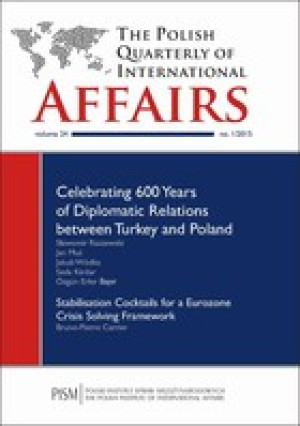
The Polish Quarterly of International Affairs nr 1/2015
Producent: Polski Instytut Spraw Międzynarodowych
The Polish Quarterly of International Affairs nr 1/2015 PRACA ZBIOROWA Articles Mohammad Houshisadat Persian Gulf Gas and LNG in the EU’s Goals for Security of Gas Supply by 2030 Energy is the major challenge of the 21st century and the world’s energy mix will change in the future, predominantly to renewables, followed by natural gas. The European Union will be the foremost gas importer by 2030 and the rate of Liquefied Natural Gas (LNG) imports will double by 2020. The UK, France, Spain and Italy are the main entry points for EU LNG imports, with approximately 80% of the regional terminals located in these countries and amounting to 87% of the Union’s LNG needs. Diversification of LNG routes and suppliers in the coming competitive LNG market is an important objective of EU energy policy. It seems that the low-cost, high-risk Persian Gulf gas-rich area could be influential to the Union’s security of energy supply in the future. The current research, furthermore, aims to analyse the role of actual Qatari LNG and potential Iranian LNG on imports by the UK, France, Spain and Italy in the coming years. This multiple case study centres on a comparison of the EU’s actual and potential LNG suppliers against the four indicators of energy security-acceptability, availability, affordability and accessibility. It attempts to determine the position of the Persian Gulf and its main regional LNG suppliers amongst the main global exporters to the EU. Sławomir Raszewski Energy Security Perceptions in Poland and Turkey A large chunk of the “energy security debate has dealt with problems of access to resources and, most recently, the degradation of ecosystems as a direct result of the socio-economic activities of humans; less focus has been on the sources of security/insecurity perceptions and misperceptions and ways to explain them. This article seeks to evaluate the origins and practices of energy security perceptions in Poland and Turkey, and within their respective regional contexts—Central and Eastern Europe and the Wider Black Sea Region. With the global energy security paradigm now encapsulating the rise of new powers, epitomised by BRICS, developments at the regional level have been playing profound roles, grouping states around key regional actors. Drawing on case study material, the evaluation serves the purpose of assessing possible axes of convergence and divergence between the two regions represented by the two countries. Jan Muś Turkey Faces the Balkans: Areas of Possible Cooperation with Poland The text highlights features of Turkish policy towards the Balkans and areas of possible cooperation with Poland. Ankara is pursuing an independent policy of deepening it is so-called strategic depth, i.e., policies towards its immediate neighbourhood, including the Southern Caucasus, Middle East, North Africa and the Balkans. Poland, on the other hand, is relying on Euro-Atlantic structures and focusing on securing its eastern flank, which as the 2014 crisis in Ukraine illustrates is far from stabilisation. Warsaw’s foreign policy priorities and Ankara’s vision of Turkey’s international role diverge, leaving little space for pointing at specific forms of cooperation on a larger scale. Nevertheless, both countries share similar strategic goals, enabling us to highlight potential areas for further collaboration—namely society, security and economy—that could pave the way for partnership. Seda Kirdar A New Area for Turkish-Polish Cooperation? Terrorism and the International Criminal Court The article focuses on the potential for Turkish-Polish cooperation on defining and countering international terrorism with reference to how the security and defence interests of both countries converge in terms of their strategic partnership at the EU Common Security and Defence Policy (CSDP) and NATO levels and how this convergence might trigger the next phase of bilateral partnership under the umbrella of the International Criminal Court (ICC). First, the current state of the international crime of terrorism in relation to the ICC will be explored; second, Turkey’s attempts to incorporate terrorism into the ICC framework will be discussed; third, the role of Poland as a member of both the EU and NATO will be outlined; and finally, the potential cooperation between Turkey and Poland on defining international terrorism will be discussed. It argues that Poland, a state party to the ICC, can encourage Turkey’s ratification of the Rome Statute by fostering a dialogue on the untapped potential of defining and countering terrorism through the mechanisms and processes of international criminal law institutionalised in the ICC. Bruno-Pierre Carrier Stabilisation Cocktails for a Eurozone Crisis Solving Framework As of late 2014, the eurozone still has yet to forge a path of sustained recovery, which means dismal conditions for many European citizens, especially
Sklep: gandalf.com.pl
Cena:
18.99
18.23
Przejdź do sklepu